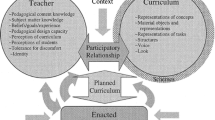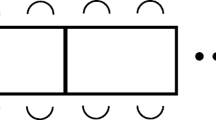Abstract
This study investigated the types of questions that prospective teachers of mathematics asked their students during whole-class discussions, how these questions changed over time, and why. Four prospective teachers were interviewed at the beginning and end of a 10-week period of student teaching to elicit their views about the kinds of questions mathematics teachers should ask. One lesson per week, for eight lessons, was video recorded for each prospective teacher. These videos were analyzed for the kinds of questions the prospective teachers asked and the nature of the responses from their high-school students. We found that the prospective teachers initially expressed the view that it was important to ask questions that required students to explain their thinking—a view that aligned with what was promoted in their teacher-preparation program—and that they attempted to ask questions with unpredictable answers in the early weeks. Over time, however, they asked fewer questions overall, with an even greater reduction in the number of questions with unpredictable answers. Interviews revealed that the prospective teachers’ views about what kinds of questions to ask were influenced, over time, by the responses of their students. The videos offered additional insights into the nature of the students’ responses.


Similar content being viewed by others
References
Agar, M. (2006). An ethnography by any other name… Forum Qualitative Sozialforschung/Forum: Qualitative Social Research, 7(4). Retrieved from http://www.qualitative-research.net/index.php/fqs/article/view/177/396. http://dx.doi.org/10.17169/fqs-7.4.177.
Alrø, H., & Skovsmose, O. (2004). Dialogic learning in collaborative investigation. Nordic Studies in Mathematics Education, 2, 39–59.
Bennett, C. (2010). “It’s hard getting kids to talk about math”: Helping new teachers improve mathematical discourse. Action in Teacher Education, 32(3), 79–89. Retrieved from http://www.tandf.co.uk/journals/UATE.
Blanton, M., Berenson, S., & Norwood, K. (2001). Using classroom discourse to understand a prospective mathematics teacher’s developing practice. Teaching and Teacher Education, 17, 227–242.
Boaler, J. & Brodie, K. (2004). The importance, nature and impact of teacher questions. In D. E. McDougall, & J. A. Ross (Eds.), Proceedings of the 26th conference of the psychology of mathematics education (North America, pp. 773–781). Toronto: OISE/UT.
Bohl, J., & Van Zoest, L. (2002). Learning through identity: A new unit of analysis for studying teacher development. In A. Cockburn, & E. Nardi (Eds.), Proceedings of the 26th annual conference of PME, (Vol. 2, pp. 137–144). Norwich: University of East Anglia.
César, M., & Santos, N. (2006). From exclusion into inclusion: Collaborative work contributions to more inclusive learning settings. European Journal of Psychology of Education, 21(3), 333–346. Retrieved from http://www.ispa.pt/ejpe/online.asp.
Chazan, D. (2000). Beyond formulas in mathematics and teaching: Dynamics of the high school algebra classroom. New York: Teachers College Press.
Common Core State Standards Initiative. (2010). Common core standards for mathematics. Retrieved from http://www.corestandards.org/assets/CCSSI_Math%20Standards.pdf
Feiman-Nemser, S. (2001). From preparation to practice: Designing a continuum to strengthen and sustain teaching. Teachers College Record, 103(6), 1013–1055.
Franke, M., Webb, N., Chan, A., Ing, M., Freund, D., & Battey, D. (2009). Questioning to elicit students’ mathematical thinking in elementary school classrooms. Journal of Teacher Education, 60(4), 380–392. https://doi.org/10.1177/0022487109339906.
Gainsburg, J. (2012). Why new mathematics teachers do or don’t use practices emphasized in their credential program. Journal of Mathematics Teacher Education, 15(5), 359–379.
Gall, M. (1984). Synthesis of research on teachers’ questioning. Educational Leadership, 42(3), 40–47.
Guskey, T. R. (1986). Staff development and the process of teacher change. Educational Researcher, 15(5), 5–12.
Hufferd-Ackles, K., Fuson, K. C., & Sherin, M. G. (2004). Describing levels and components of a math-talk community. Journal for Research in Mathematics Education, 35(2), 81–116.
Inoue, N., & Buczynski, S. (2011). You asked open-ended questions, now what? Understanding the nature of stumbling blocks in teaching inquiry lessons. The Mathematics Educator, 20(2), 10–23. http://math.coe.uga.edu/tme/tmeonline.html.
Kawanaka, T., & Stigler, J. (1999). Teachers’ use of questions in eighth-grade mathematics classrooms in Germany, Japan, and the United States. Mathematical Thinking and Learning, 1(4), 255–278.
Kelly, S., Olney, A. M., Donnelly, P., Nystrand, M., & D’Mello, S. K. (2018). Automatically measuring question authenticity in real-world classrooms. Educational Researcher, 47(7), 451–464.
Kohler, F., Henning, J. E., & Usma-Wilches, J. (2008). Preparing preservice teachers to make instructional decisions: An examination of data from the teacher work sample. Teaching and Teacher Education, 24, 2018–2117.
Lampert, M. (2001). Teaching problems and the problems of teaching. New Haven: Yale University Press.
Lampert, M., & Ball, D. L. (1999). Aligning teacher education with contemporary K-12 reform visions. In L. Darling-Hammond & G. Sykes (Eds.), Teaching as the learning profession: Handbook of policy and practice (pp. 33–55). San Francisco: Jossey Bass.
Lampert, M., & Blunk, M. (Eds.). (1998). Talking mathematics: Studies of teaching and learning in school. New York: Cambridge University Press.
Lloyd, G. M. (2008). Teaching mathematics with a new curriculum: Changes to classroom organization and interactions. Mathematical Thinking and Learning, 10(2), 163–195. https://doi.org/10.1080/10986060701854482.
Lobato, J., Clarke, D., & Ellis, A. B. (2005). Initiating and eliciting in teaching: A reformulation of telling. Journal for Research in Mathematics Education, 36(2), 101–136.
Moyer, P. S., & Milewicz, E. (2002). Learning to question: Categories of questioning used by preservice teachers during diagnostics mathematics interviews. Journal of Mathematics Teacher Education, 5(4), 293–315.
Nasir, N. S., Hand, V., & Taylor, E. V. (2008). Culture and mathematics in school: Boundaries between “cultural” and “domain” knowledge in the mathematics classroom and beyond. Review of Research in Education, 32, 187–240.
Nathan, M., & Knuth, E. (2003). A study of whole class mathematical discourse and teacher change. Cognition and Instruction, 21(2), 175–207.
Planas, N., Morgan, C., & Schütte, M. (2018). Mathematics education and language: Lessons and directions from two decades of research. In T. Dreyfus, M. Artigue, D. Potari, S. Prediger, & K. Ruthven (Eds.), Developing research in mathematics education: Twenty years of communication, cooperation and collaboration in Europe (pp. 196–210). London: Routledge.
Rich, P. J., & Hannafin, M. J. (2008). Decisions and reasons: Examining preservice teacher decision-making through video self-analysis. Journal of Computing in Higher Education, 20(1), 62–94.
Sahin, A., & Kulm, G. (2008). Sixth grade mathematics teachers’ intentions and use of probing, guiding, and factual questions. Journal of Mathematics Teacher Education, 11(3), 221–241.
Schleppenbach, M., Perry, M., Miller, K. F., Sims, L., & Fang, G. (2007). The answer is only the beginning: Extended discourse in Chinese and U.S. mathematics classrooms. Journal of Educational Psychology, 99, 380–396. https://doi.org/10.1037/0022-0663.99.2.380.
Schoenfeld, A. (1998). Toward a theory of teaching-in-context. Issues in Education, 4(1), 1–94.
Sfard, A., & Kieran, C. (2001). Cognition as communication: Rethinking learning-by-talking through multi-faceted analysis of students’ mathematical interactions. Mind, Culture, and Activity, 8, 42–76.
Simon, M. A., & Tzur, R. (1999). Explicating the teacher’s perspective from the researchers’ perspectives: Generating accounts of mathematics teachers’ practice. Journal for Research in Mathematics Education, 30(3), 252–264.
Simon, M. A., Tzur, R., Heinz, K., Kinzel, M., & Smith, M. S. (2000). Characterizing a perspective underlying the practice of mathematics teachers in transition. Journal for Research in Mathematics Education, 31(5), 579–601.
Sleep, L. (2012). The work of steering instruction toward the mathematical point: A decomposition of teaching practice. American Educational Research Journal, 49, 935–970.
Smith, M. S., & Stein, M. K. (2011). Five practices for orchestrating productive mathematical discussions. Reston, VA: National Council of Teachers of Mathematics.
Staples, M. (2007). Supporting whole-class collaborative inquiry in a secondary mathematics classroom. Cognition and Instruction, 25(2/3), 161–217.
Stein, M. K., Engle, R. A., Smith, M. S., & Hughes, E. K. (2008). Orchestrating productive mathematical discussions: Five practices for helping teachers move beyond show and tell. Mathematical Thinking and Learning, 10(4), 313–340. https://doi.org/10.1080/10986060802229675.
Stevens, R. (1912). The question as a measure of efficiency in instruction: A critical study of classroom practice. Contributions to Education, 48, 1–95.
Weiland, I. S., Hudson, R. A., & Amador, J. M. (2014). Preservice formative assessment interviews: The development of competent questioning. International Journal of Science and Mathematics Education, 12(2), 329–352.
Author information
Authors and Affiliations
Corresponding author
Additional information
Publisher's Note
Springer Nature remains neutral with regard to jurisdictional claims in published maps and institutional affiliations.
Rights and permissions
About this article
Cite this article
Gaspard, C., Gainsburg, J. Abandoning questions with unpredictable answers. J Math Teacher Educ 23, 555–577 (2020). https://doi.org/10.1007/s10857-019-09440-5
Published:
Issue Date:
DOI: https://doi.org/10.1007/s10857-019-09440-5




